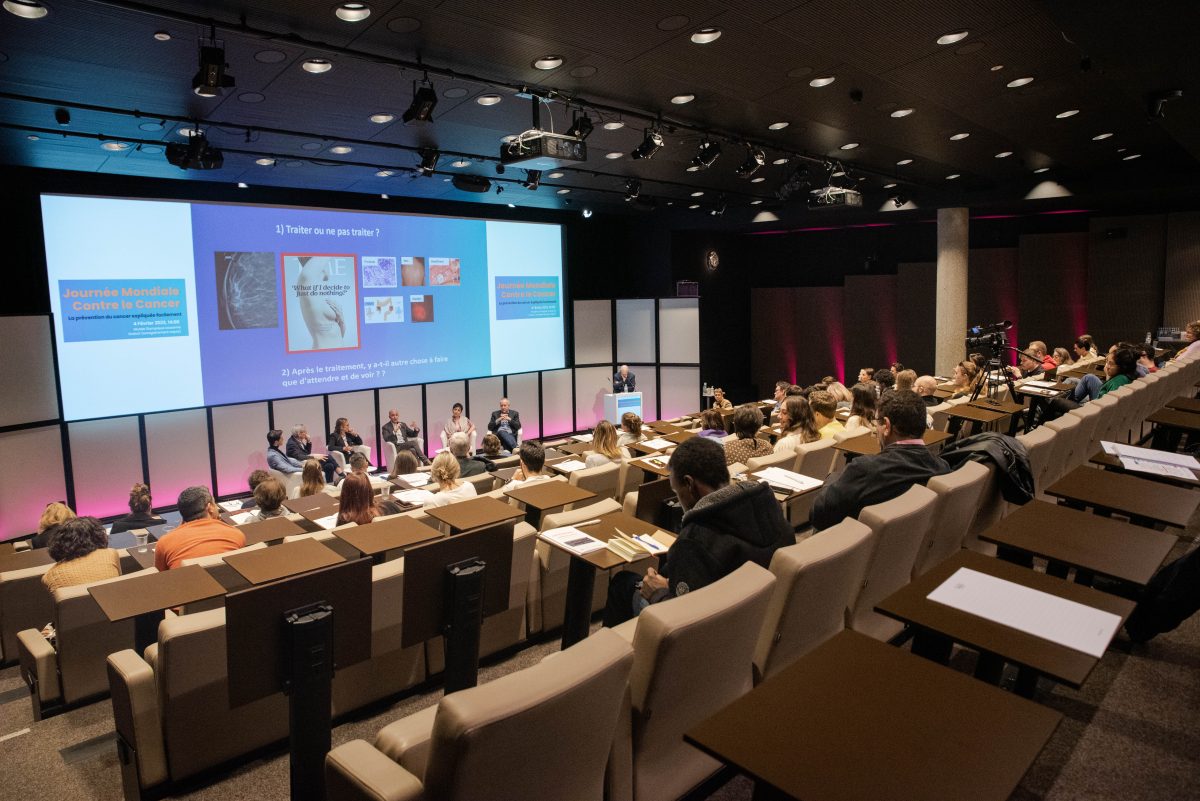Prioritizing Cancer Prevention: A Call to Action on World Cancer Day
On February 4th every year, people worldwide unite to raise awareness about cancer on World Cancer Day. In 2023, the International Cancer Prevention Institute (ICPI) - a global hub for cancer research, education, and advocacy based in Switzerland - hosted a remarkable public event at the Olympic Museum in Lausanne. The event brought together researchers, clinicians, and the public to discuss diverse aspects of cancer prevention, with skin cancer as a tangible example of major societal impact. Thanks to the generous support of Debiopharm, the event was entirely free to attend.
In a world where cancer numbers are increasing, the focus on cancer prevention is becoming ever more relevant. Recent predictions concerning the evolution of cancer incidence rates in Switzerland have revealed that the number of new cancer cases will increase substantially. These predictions are primarily due to demographic evolutions, such as population growth and aging. One of the only exceptions is an increase in cutaneous melanoma in men, where an increase in risk partly contributes to the rise in new cancer cases. This expected increase in cutaneous melanoma in men calls for more efficient preventive or early detection measures.
Therefore, cancer prevention was the topic of World Cancer Day 2023. The topic piqued the interest of healthcare workers, policymakers, and a broad public alike. On Saturday afternoon, the first attendees of World Cancer Day began to trickle into the Olympic Museum in Lausanne, and it did not take long before the auditorium was filled with enthusiastic and engaged participants.
The Ligue vaudoise contre le cancer (LVC), the Swiss Association for Tobacco Control (AT Switzerland), the Swiss Society of Dermatology and Venereology (SSDV), and the Swiss Institute for Accident Insurance (SUVA) kicked off the event with informative talks. These presentations shed light on the socio-economic aspects of cancer and the current policy landscape in Switzerland. It was noted that there is a pressing need to improve regulations surrounding occupational exposure to sunlight, and to improve legal measures for tanning salons and smoking. Fortunately, cancer is now regarded as a manageable chronic disease and is shedding its psychological stigma. This presents opportunities for advancing primary, secondary and tertiary prevention efforts.
Following this session, an oncologist from Inselspital, Bern and a dermatologist from CHUV, Lausanne outlined the clinical advantages of prevention and early detection, and which screenings are available. Young researchers presented the latest research and innovations in cancer prevention, and the final dissemination relayed how dancing can be a valuable therapy for improving psychical and psychological outcomes in cancer patients.
The event provided attendees with the opportunity to connect with local cancer support groups, researchers and clinicians. Informative leaflets from the SSDV were distributed, and a lively panel discussion, reflecting the interdisciplinarity of ICPI, took place with healthcare professionals, thanks to the interaction with an interested audience. The discussion induced a common sense and a better understanding of the challenges that still need to be addressed, and demonstrated the need to include politicians in future editions to increase the impact of events such as these.
A sense of community and shared purpose
«We are thrilled to have hosted such a successful event for World Cancer Day,» said the founders of the International Cancer Prevention Institute, Prof. Dr. Gian-Paolo Dotto and Prof. Dr. Cathrin Brisken.
«It was inspiring to see so many people come together to raise awareness about cancer prevention and to share their experiences and knowledge. We hope that this event will encourage more people to take action and we are looking forward to holding this event on a yearly basis.»
A public survey held after the event revealed a solid base for future editions of this event. All respondents expressed their desire to participate in a similar future event, and they expressed a particularly high level of satisfaction concerning the quality and content of the talks, as well as the location.
Predicting the impact and magnitude of preventive measures for cancer remains difficult, especially in a country such as Switzerland, where organized cancer screening programs often occur at a regional instead of a federal level. Nonetheless, measures of prevention have been shown to be successful in various cancers. The predicted stabilization of tobacco-related cancers is in line with smoking ban policies in public places and the reduction of smoking prevalence. Thus, more effective and sustained prevention measures will be required to counter the predicted increase in cutaneous melanoma, especially in men. Increasing awareness of cancer prevention via public events is one way to serve this purpose.
In conclusion, the success of the World Cancer Day event held on February 4th demonstrated the power of collaboration in raising awareness about cancer prevention and early detection. Participants from various backgrounds united to gain a deeper understanding of the risk factors for different types of cancer and how to detect them early.
The event's momentum continues to inspire ongoing efforts to prepare for future events, such as World Cancer Day 2024. See you there!
Please visit International Cancer Prevention Institute for a photo report, as well as an accompanying video, which was prepared by DiasporaTV.
Author
An Buckinx, PhD
Director of Scientific Communication
International Cancer Prevention Institute, Épalinges

